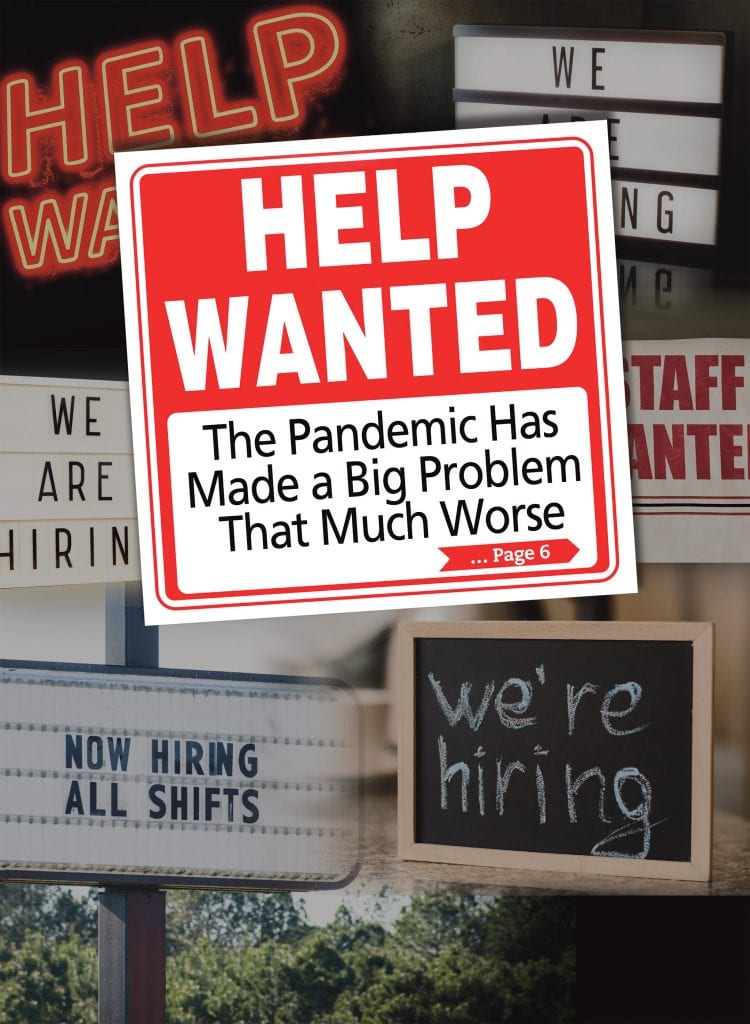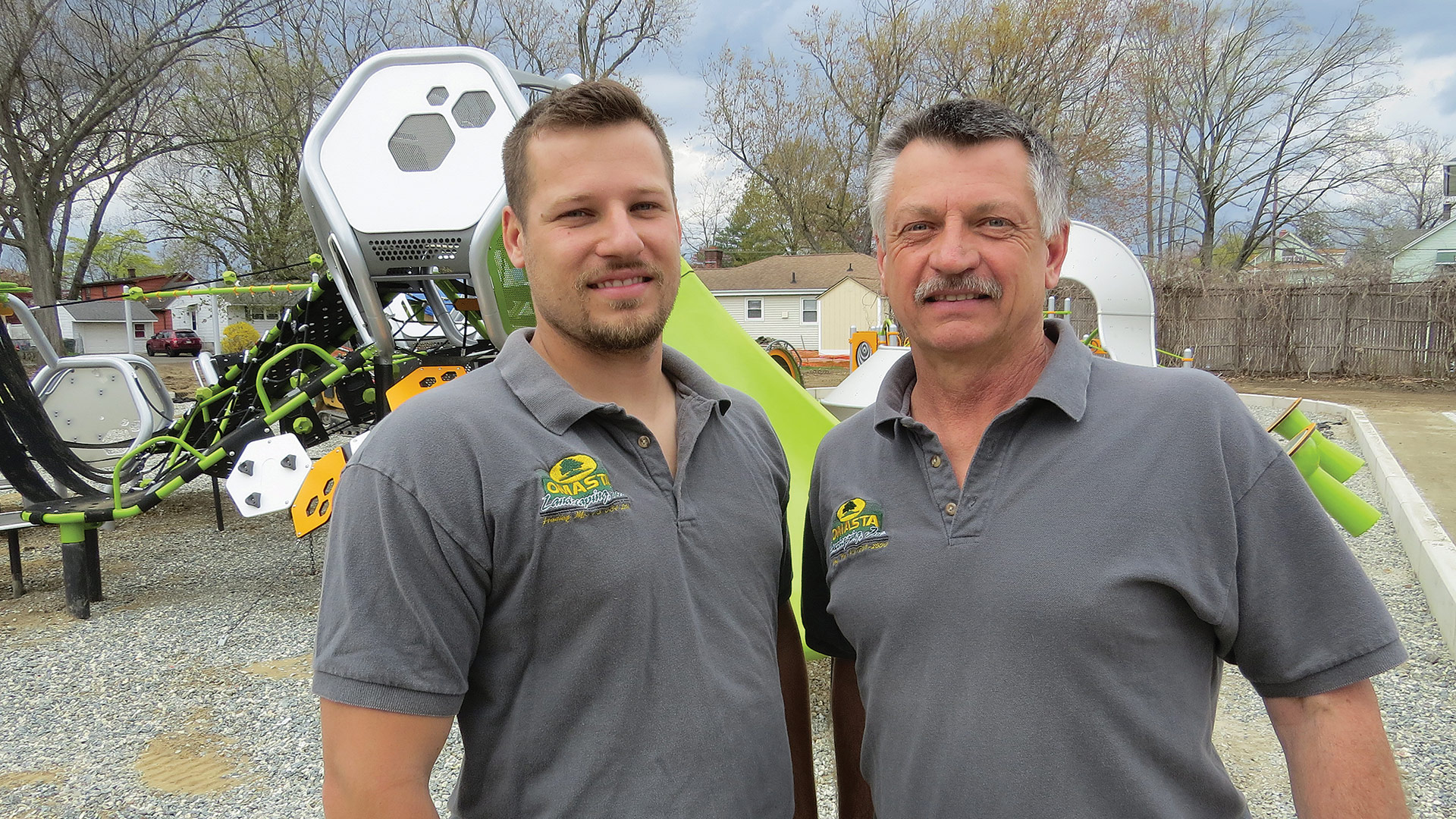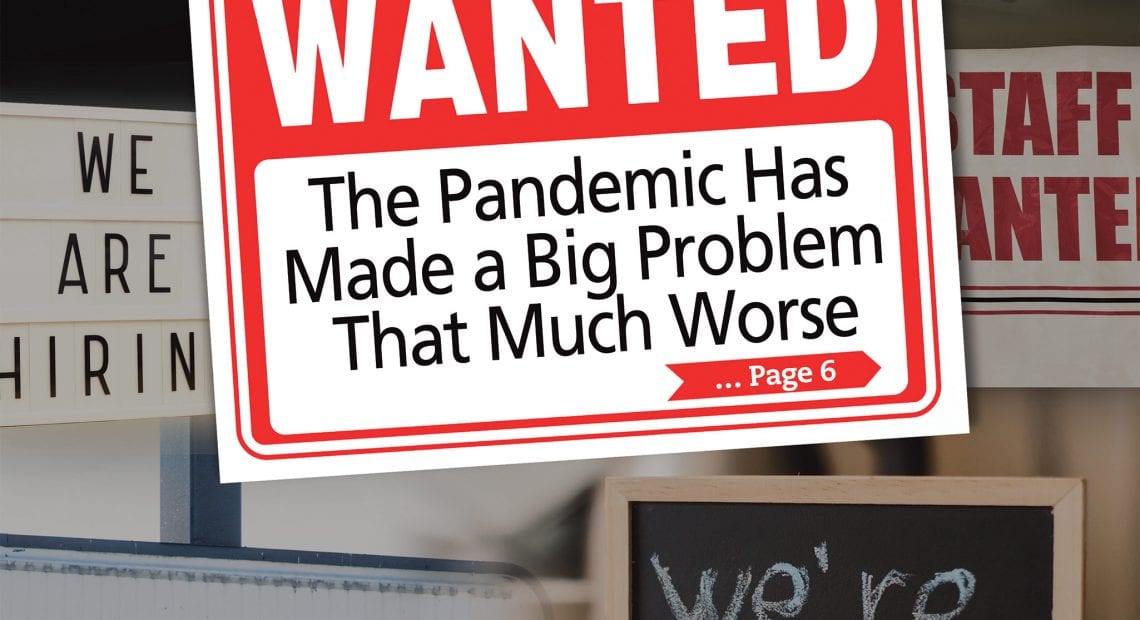Help Wanted
 Long before COVID-19 arrived in Western Mass., businesses across many sectors were struggling to find adequate supplies of good help. But now, just as the economy seems ready to surge, the problem, fueled increasingly by unemployment benefits that are conspiring to keep workers on the sidelines, is getting considerably worse, with no real end in sight.
Long before COVID-19 arrived in Western Mass., businesses across many sectors were struggling to find adequate supplies of good help. But now, just as the economy seems ready to surge, the problem, fueled increasingly by unemployment benefits that are conspiring to keep workers on the sidelines, is getting considerably worse, with no real end in sight.
Steve Corrigan has been in the landscaping business for more than 40 years now, and for most of that time, finding good help has been a challenge — to one degree or another.
But he says he’s never seen anything quite like this.
“Between our Chicopee location, a small branch we have in Wilbraham, and the office we have in Manchester, Conn., we probably have 12 to 15 positions we could fill tomorrow if we could find the people,” said Corrigan, president of Mountain View Landscapes and Lawncare, adding that this is a mighty big ‘if’ at the moment. “It’s crazy what’s going on — and it’s across the board.”
Indeed, his company is one of countless businesses across virtually every sector of the economy that are struggling mightily to fill positions, even as unemployment remains somewhat high in the wake of the COVID-19 pandemic. There are many reasons for this imbalance between open positions and adequate supplies of qualified help, but the main culprit comes in the form of federal unemployment benefits, including a $300 weekly bonus that is part of the American Rescue Plan. These benefits, say area employers, are serving as a strong deterrent to putting people back into the workforce.
“When you do the math, if you took a person making $20 an hour … with their normal unemployment, they’d be getting $500 to $600 a week,” said Corrigan. “Throw another 300 bucks on top of it … and why would you go to work for $20 an hour? It doesn’t make sense.”
Employers have been posing similar questions since the first stimulus-related unemployment benefits — complete with a $600 weekly bonus — were approved roughly a year ago. But the situation is even more precarious now, because the economy, after a slow to very slow 2020, depending on the sector of the economy, is starting to rev up again. And just as companies are looking forward to consumers going back out again and spending some of the money they’ve been saving over the past 14 months, businesses are being hit with pervasive hiring issues — and deep concerns about if and when the situation might improve.
As noted, the problem exists across the board — with landscapers, home-improvement companies, and pool installers; restaurants and banquet facilities; golf courses and local farm stands; manufacturers and service businesses.
In response to the problem, employers have tried a number of strategies — from sign-on bonuses to higher wages to rewards for referrals that lead to new hires. Meanwhile, most all forms of marketing for businesses in a variety of sectors now include references to looking for help, being a great place to work, or both.
For the most part, these strategies seem to be generating lukewarm results, with those unemployment benefits being just one of many issues to contend with. Another is the inability, or unwillingness, on the part of most states, including this one, to enforce the basic rules pertaining to unemployment eligibility.

Greg Omasta, right, seen here with his son, Chris, at the new Walsh Park in Springfield, says his company has responded to the ongoing challenge of finding workers by hiking wages above the average for this region.
“Most of the states have done away with the requirement that people on unemployment actively look for work,” said Meredith Wise, president and CEO of the Employers Assoc. of the NorthEast, which has seen its hotline handle a number of calls related to this matter and a host of related issues. “In pre-pandemic times, if people were on unemployment, they had to prove that they were physically out there looking for work — applying for jobs, looking at the help-wanted ads, and actively seeking work. And those with the state would occasionally ask them to prove that they were doing all this. With the pandemic, the employment offices have been overrun, and states took away that requirement that you were looking for work.”
Perhaps the best hopes for area employers are that returning college students and area high-school students soon to be off for the summer might increase the pool of applicants — and that the unemployment benefits are due to expire in September.
But even those hopes are tempered by the realization that September is a ways off, and the benefits may well be extended by elected officials who have already shown a willingness to do that.
“It’s crazy what’s going on — and it’s across the board.”
So companies, some of them with the help of EANE and even area marketing companies, are honing their messages and updating their hiring strategies in the hope they will have enough warm bodies to take advantage of what is expected to be an uptick — if not a surge — in the economy.
For this issue, we look at what they’re up against and what they doing in the face of this growing challenge to their ongoing success.
Labor Pains
As they talked with BusinessWest about the hiring challenges they’re now facing, business owners, almost with one voice, said that COVID has simply exacerbated a problem that has existed for some time now.
Indeed, the phrase ‘skills gap’ has been a part of the local lexicon for years now, with many businesses, especially those in manufacturing, but in other sectors as well, struggling to find adequate supplies of help, with the degree of difficulty varying with the relative condition of the economy.
Chad Jzyk, HR business partner for Charter Next Generation (CNG), a Turners Falls-based manufacturer of plastic blown film for the medical industry, said the company has been challenged to find help for several years now. But the problem has reached a new level in recent months.
“There’s not a huge availability of workers — the pipeline of basic-skilled applicants is really non-existent,” he noted, adding that the company has been running with one and a half to two open positions monthly on an almost constant basis for some time now. COVID has made the situation worse, at a time when the opposite might be expected because of the number of people out of work, and for several reasons, he said.
“With the stimulus checks and unemployment extension, the availability of workers has been impacted in a negative way,” he said, referring to both the number of applicants in the pool and their willingness to accept an employment opportunity.
“We’ve tried to engage with a couple of temporary agencies,” he went on. “In the past, it was common that you would have an applicant pool of temporary workers of between 15 and 20 people that were already pre-screened and ready to go — you’d call the employment agency and, pretty much on the spot, get someone in 24 hours. Working with a few local agencies that we’ve traditionally worked with … there’s no applicant pool; they’re seeing the same thing.”
Jzyk said the company’s hiring challenges have yet to directly impact production or limit its ability to take on new orders. However, he said it does limit CNG’s ability to be more “proactive,” as he put it, and do more when it comes to training and flexibility with employees’ responsibilities.
For other employers, the shortage of workers represents a real threat to day-to-day operations and especially the ability to handle the larger volumes of business expected as the region returns to something approaching normal as vaccinations rise and consumers venture back out to restaurants, bars, museums, stores, and more.
Nadim Kashouh, owner of Nadim’s Downtown Mediterranean Grill in downtown Springfield, said he’s looking forward to the return of shows to the MassMutual Center and other forms of vibrancy, but he quickly, as in very quickly, changed to the subject of staffing and his ongoing concerns about whether he can find enough help to handle whatever surge comes.

Meredith Wise says the escalating challenges facing employers looking to hire are prompting wage skirmishes in some sectors.
“I hesitate to get too excited because one of the things we’re dealing with right now is the lack of people who want to work,” he told BusinessWest, gesturing to a lighted message board behind the bar. Among the many messages being delivered is that help is wanted — and that display is just one of many ways that point is being made.
“We have created a commercial that focuses on how our patio will be open soon,” he said. “But it also notes that we’re looking to hire people — we need to keep letting people know that.”
Fran Beaulieu, second-generation president of Phil Beaulieu & Sons Home Improvement in Chicopee, said the hiring crunch, which is certainly nothing new for that sector, has resulted from a number of factors, with COVID-related issues being only the latest additions.
Overall, fewer people have been getting into the trades, he said, and this has left the region with a shortage of carpenters and other specialists.
“You basically have an entire generation that didn’t get into the trade,” he noted, adding that, despite a wide-ranging effort involving social media and other strategies, the company has a workforce that is 30% short of what is needed. And this harsh reality is certainly impacting the firm’s ability to take on jobs — at a time when jobs are plentiful, again, due to COVID and people home so much and often of a mind to improve their surroundings.
“Finding projects has never been the problem; the problem has been managing your labor in accordance with how many projects you have sold,” Beaulieu said. “You almost have to stop selling after a while because you just don’t have the help.”
Hire Power
In the wake of the ongoing struggle to find adequate supplies of help, area businesses are taking a number of steps, with aggressive marketing of their staffing needs being just one of them.
Indeed, companies have initiated hiring bonuses and rewards for those who refer candidates who eventually sign on. Meanwhile, others are hiking wages, said Wise, adding that, in some sectors, wage skirmishes have arisen, the likes of which have not been seen in some time, if ever.
“What we’re seeing happening, and it’s a little scary, is that, for some positions, wage battles have ensued,” she said. “People are saying, ‘I’ll pay you $2 more an hour to come work for me because I need the help,’ and the employee goes back to his employer and says, ‘they’re willing to give me $2 more an hour; will you give me $3 more an hour to stay here?’
“There are some positions where people are willing to pay a premium to get individuals to come to work,” she went on. “And it’s starting to affect different kinds of businesses.”
One of them is the broad landscaping and lawncare sector, she noted, which has historically faced challenges to maintaining adequate staffing and is now seeing its problems escalate due to the many aspects of COVID.
Greg Omasta, owner of Hadley-based Omasta Landscaping Inc., said this has certainly been a trying year.
“Most of the states have done away with the requirement that people on unemployment actively look for work.”
“The government incentives allow people to stay home and get paid more than if they actually went to their job on a daily basis — so some of the problems small businesses are facing in this country are inflicted by our government,” he told BusinessWest, adding that some of those the company had to lay off at the end of last season have opted not to come back when offered the chance, instead choosing to collect unemployment. “But there’s a general lack of people out there in the labor force who want to work hard, like in the trade we’re in, the landscaping business. A lot of people want to sit beyond a computer screen and punch a keyboard all day.”
Historically, the company, like others in this sector, has relied heavily on legal immigrants, many from Mexico and Guatemala, he said, adding that even this pipeline has become less reliable in recent years.
As a result of this ongoing challenge, he said the company has changed the way it compensates employees, with the goal of attracting and retaining better candidates. By and large, it’s a strategy that has worked, although this year, given the many additional COVID-related challenges and responses within the industry, it is certainly being tested.
“We’re probably one of the higher-paying landscape contractors in the area,” said Omasta, whose company handles a number of large commercial accounts and municipal facilities, such as the recently reopened Pynchon Plaza in downtown Springfield, as well as residential customers. “We do that because we try to attract better people and keep those people here. Paying that higher hourly wage makes a difference in the people that we’re able to find, keep, and employ.”
Corrigan, who can certainly relate to all that, said his company hired someone to handle recruiting full-time just before COVID hit. To say her job has become difficult, and frustrating, in the wake of the pandemic and the various stimulus packages would be an understatement.
“She’s at her wit’s end with people right now,” he said, adding that, between a hesitancy to work among many people and drug tests often standing in the way of those do want to work, the talent pool has become increasingly smaller.
Chad Jzyk
“There’s not a huge availability of workers — the pipeline of basic-skilled applicants is really non-existent.”
And this shrinking pool has definitely impacted Mountain View’s ability to expand the commercial side of its business and grow.
“We’ve had discussions — heated discussions — in our budgeting processes,” Corrigan said. “We ask ourselves, ‘how can you grow if you can’t get the help?’ And the obvious answer is, ‘you can’t.’”
The Job at Hand
It is that obvious answer that is keeping many business owners and managers awake at night.
Indeed, at a time when the challenges seem to be mounting for businesses of all sizes and in most all sectors — Omasta referenced the rising cost of materials such as lumber, still-escalating fuel prices, the specter of inflation, and the very real possibility of higher corporate taxes — finding good help is the one that poses the biggest threat to companies at a time when many are poised to break out from pandemic-induced doldrums.
What will happen between now and September, and even after September, remains to be seen, but it seems clear that these scary times, as Wise and others called them, are certainly far from over.
George O’Brien can be reached at [email protected]







